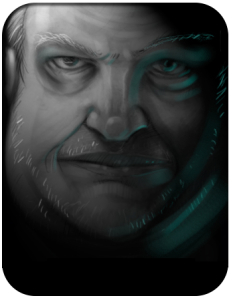DETECTIVE MOXLEY, Part 8: “REMF”
 “You’re in a lot of trouble, Moxley.”
“You’re in a lot of trouble, Moxley.”
Moxley, shackled at the wrists, looked up at the newcomer. Major Iglesias stood even straighter at the man’s entrance, although Mox couldn’t say how that was possible. Iglesias had a stick up his nether regions that seemed to run from stem to stern.
The major had busied himself with glaring for the last hour. He was very good at it. Iglesias might have been a statue in the corner of the interrogation room, for all that he had moved. There was nothing else in the room except the wooden table and two folding chairs. The resin blocks from which the room was built had been airlifted to the border zone in great cargo pods. All of the military’s semi-permanent construction used these interlocking bricks.
“Look,” said Moxley.
“No,” said the newcomer. He tapped his rank insignia. “You look.” His name tag, “MILLER,” was subdued in color, almost illegible. The Conks were enthusiastic snipers.
“Colonel,” said Moxley. “Maybe I don’t understand—”
Miller actually laughed. “That,” he said, pretending to wipe a tear from his eye, “is an understatement, Sergeant. Let me see if I can’t break this down for you. A supply Sergeant who has spent his entire military career as a rear echelon mother—”
“I don’t have to take this,” said Moxley, rising in his chair. That woke up Iglesias, who sprang forward and clamped down on both Moxley’s shoulders. The Major’s grip was like iron. Moxley sat, refusing to show the pain he felt. His eyes were watering.
“The Major showed you a recording,” said Miller. “That recording is an official piece of government surveillance. Maybe you understand the significance of this.”
“Aren’t you a little young to be a Colonel?” asked Moxley.
“Aren’t you a little fat to be a Sergeant?” said Miller. “Lose the attitude, Moxley. It’s not going to serve you, where you’re going.”
“And where is that?”
“To military prison,” said Miller. “Do you hear me now, Sergeant Moxley? You’re going to prison for war crimes.”
“That’s crap,” said Moxley. “I’ve never done anything. I run a clean shop.”
“It’s not your shop, Sergeant. I thought that was clear. It’s the Conks you murdered.”
“How in the Hell is fending off an invading offensive anything like murder?” Moxley demanded. “Has everyone gone insane?”
Miller looked up at Iglesias. He jerked his chin. The Major took the hint and exited the room, closing the alloy door behind him.
“All right,” said Miller. “This is off the record, Sergeant. It’s just you and me. If you ever repeat anything I’m going to say to you—”
“No one will believe me,” said Moxley.
“Oh, they might,” said Miller. “Anything’s possible. But I’ll have you killed.”
Moxley swallowed. “I’m listening.”
‚ÄúThe war has not been a popular one,‚Äù said Miller. ‚ÄúCertain forces in our government are agitating for… call it pushback, if you like. Elements within our government must be punished. Reparations for the incredibly political incorrectness of our war on the Conquistas.‚Äù
“Our war on them,” said Moxley.
‚ÄúPrecisely,‚Äù said Miller. ‚ÄúShooting soldiers who‚Äôve surrendered… that‚Äôs a war crime, Moxley. These things are frequently overlooked when there is no official surveillance footage, but in this case, there‚Äôs no disappearing the records. You‚Äôre on camera in all your xenophobic glory, Sergeant. You‚Äôll be lucky to avoid execution.‚Äù
Moxley opened his mouth to protest. Then it clicked for him. He turned to look at the door through which Iglesias had left. Then his eyes swept the empty interrogation room. There were no cameras. There was no recording equipment.
“You don’t care what happened,” said Moxley. “You’re throwing me to the wolves. I’m being used to fill a quota. Make it look like the government is policing its troops.”
“You see?” said Miller. “You’re really not as stupid as you look, Sergeant.” He stood and walked to the door. Over his shoulder, he said, “I take no pleasure in my job, Moxley,” said Miller. His wide grin made the statement a lie. “You’re just in the wrong place at the wrong time. You understand how it is.” He unsealed the door and left. A mechanical lock cycled closed.
“Yeah,” said Moxley to the empty room. “I understand how it is.”
* * *
Moxley opened his eyes. The cracked and stained ceiling of his office was unchanged. He dragged his wrist into position before his eyes so he could check his watch.
Four hours. He supposed that was all he was likely to get. He managed, with some difficulty, to swing his legs onto the floor. His pack of vapor tubes was on the desk. Thumbing one alive, he stuck it in his mouth.
I should quit, he thought again. I’m going to quit.
He dropped into the chair behind his desk, leaned forward, and switched on the coffeemaker. It was the middle of the night, an hour when few civilized people were awake. That meant Lobby would be up. He tapped in the code from memory and waited for the desk terminal to connect.
“This line is permanent discon,” said the machine. “This line is permanent discon. This line is permanent—”
“Lobby, it’s me,” said Moxley.
“This line is permanent discon.”
“It’s Mox, Lobby,” said Moxley.
The screen went blank. Finally, the image coalesced into a digital oval. It looked like a smiley face.
“Mox,” said the face. The voice was distorted, artificial.
“I need your help, Lobby,” said Moxley. “And for God’s sake, turn off that creepy thing. It gives me nightmares.”
“It would if you slept.”
“Fair point,” said Mox. “I can’t talk to you like this. Give me a location and I’ll meet you.”
“The usual,” said the smiley face.
“Half an hour?” said Mox.
“Make it an hour. I’ve got something on the stove.” The screen switched back to the carrier warning. “This line is permanent discon. This line—”
Moxley switched off the terminal and took a deep drag from his tube. One hour. Okay. He could probably get nicely drunk in an hour.

